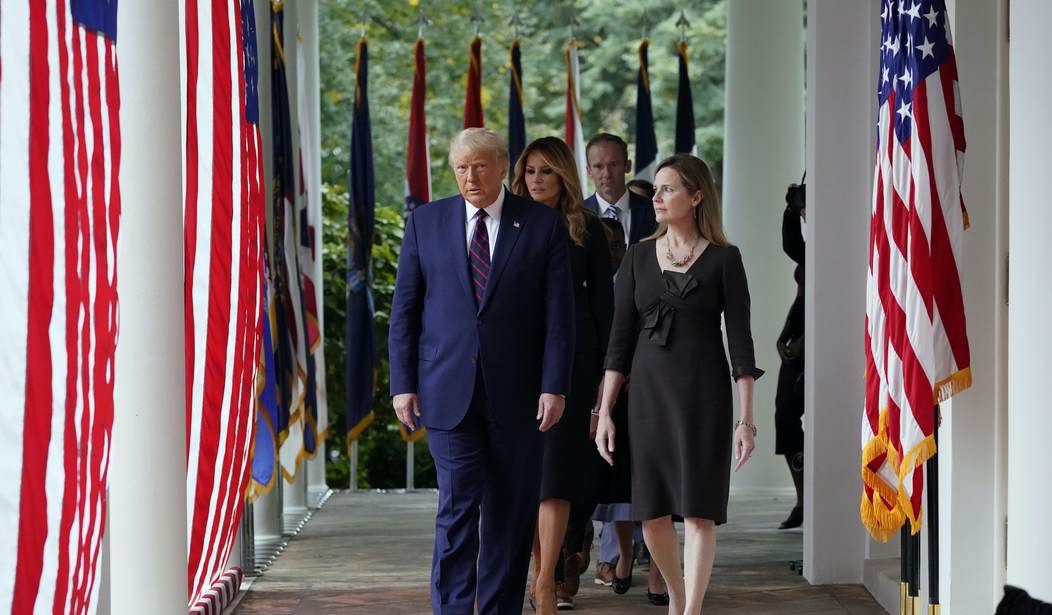Amy Coney Barrett refuses to identify as a “role model.” But one title she readily accepts is “mentor.”
On September 26, President Trump nominated Judge Amy Coney Barrett to fill the Supreme Court vacancy left by the late Justice Ruth Bader Ginsburg. Even before her nomination, media outlets attacked Judge Barrett as anti-woman and “anti-choice.” Several went so far as to incorrectly assume that her faith inspired The Handmaid’s Tale, a 1985 dystopian novel that imagines a country run by Christian fundamentalists where female “handmaids” are raped and forced to bear children. And yet, if they removed their politically-colored lens, the media might see that Judge Barrett has the potential to serve as a source of inspiration to women on both sides of the aisle.
Placing politics aside, even legal experts who disagree with Judge Barrett agree she’s brilliant and qualified.
The New Orleans native graduated summa cum laude from Notre Dame Law School before clerking for the late Justice Antonin Scalia. After practicing law in Washington, D.C., and teaching at the George Washington University Law School, she returned to Notre Dame as a law professor. In 2017, she was confirmed as a judge on the U.S. Court of Appeals for the Seventh Circuit.
If confirmed to the Supreme Court, she would be the youngest justice and, according to President Trump, the first female justice ever with school-aged children. That’s because she and her husband Jesse, also an attorney, boast seven children – including two adopted from Haiti and one with Down syndrome.
“I'm used to being in a group of nine: my family,” Judge Barrett said of her nomination to be one of the nine justices. “Our children are my greatest joy."
She also recognized one of the women who came before her, Justice Ginsburg, who “began her career at a time when women were not welcome in the legal profession.”
Like Ginsburg, Judge Barrett also entered the legal sphere when women were in the minority.
“Male students definitely outstripped female students” when she attended Notre Dame, she said at an alumni event last year. And on the faculty, she could only think of two women.
But at the event, held by the Notre Dame alumni club of Washington, D.C., she admitted that the legal world was changing as more women entered and sought accommodations.
Recommended
“I think being able to take your child to a faculty meeting when you need to, having toys in the office, having leave policies that make it possible to work or flex policies that make it possible to return to work, all of those,” she said, “I see so many more options for women now in that regard than I did when I was a young lawyer.”
“I think it’s great,” she concluded.
But even as a successful woman working in law, she stressed, “I hate to think of myself as like a role model.” Instead, she saw herself as a mentor, a responsibility which she defined as taking the time to talk and meet with mentees.
That’s because, she said, “time is the most precious thing really that we have that we can give to other people.”
In the midst of managing her time, Judge Barrett responded to the question, “Can women really have it all?” at a Hillsdale College event last year.
Recognizing the 100th anniversary of the 19th Amendment, she insisted that “we should celebrate the ability of women to not only cast their ballots but to participate in both the private and the public spheres in so many ways that our grandmothers were not able to.”
She stressed that there isn’t a prototype for women – and that that’s a good thing.
“I think each woman is called to a unique path,” she urged. “I don’t think there’s one cookie-cutter way that women should proceed.”
“One thing I think that is really important not to lose sight of, is that we are so fortunate as women living in 2019 to have so many more doors open to us, and so many choices,” she began. “But I think as part of that conversation, I always want to be careful never to devalue the choices that women make that are different.”
The oldest of seven, she has five sisters. Of those five, she said, “three of us work full time, two of us work part time, and one stays home with her children and she homeschools them.”
“And she probably works harder than the rest of us,” Judge Barrett remarked.
It also helps to have an ally.
“I couldn’t manage this very full life without the unwavering support of my husband,” she said at her nomination, who “does far more than his fair share of work.”
She made similar comments at the alumni event, where she noted, “I think what’s really made it work is that it’s very much a team effort.”
Still, they didn’t have everything planned out.
“I didn’t know exactly what I wanted my life to look like,” she stressed at Hillsdale. “It kind of became a work – it was always, it still is – a work in progress.”
At the alumni event, she remembered feeling “terribly guilty” about placing Emma, her firstborn, in childcare.
“I thought, ‘should I stay home with her?’” she recalled. “I felt a lot of anxiety about whether I was doing the best thing.”
In addition to Justice Ginsburg, Judge Barrett has also acknowledged Justice Sandra Day O’Connor.
“I’m the first woman from Indiana to sit on the Seventh Circuit in one of the Indiana seats and it’s really hardly worth notice,” she explained, during an interview with The Heritage Foundation this year. “That’s because of women like Justice O’Connor.”
Judge Barrett knows what she wants people to say about her when she’s gone too. When asked at the alumni event, she responded without hesitation.
“That she loved well,” she said.

























Join the conversation as a VIP Member